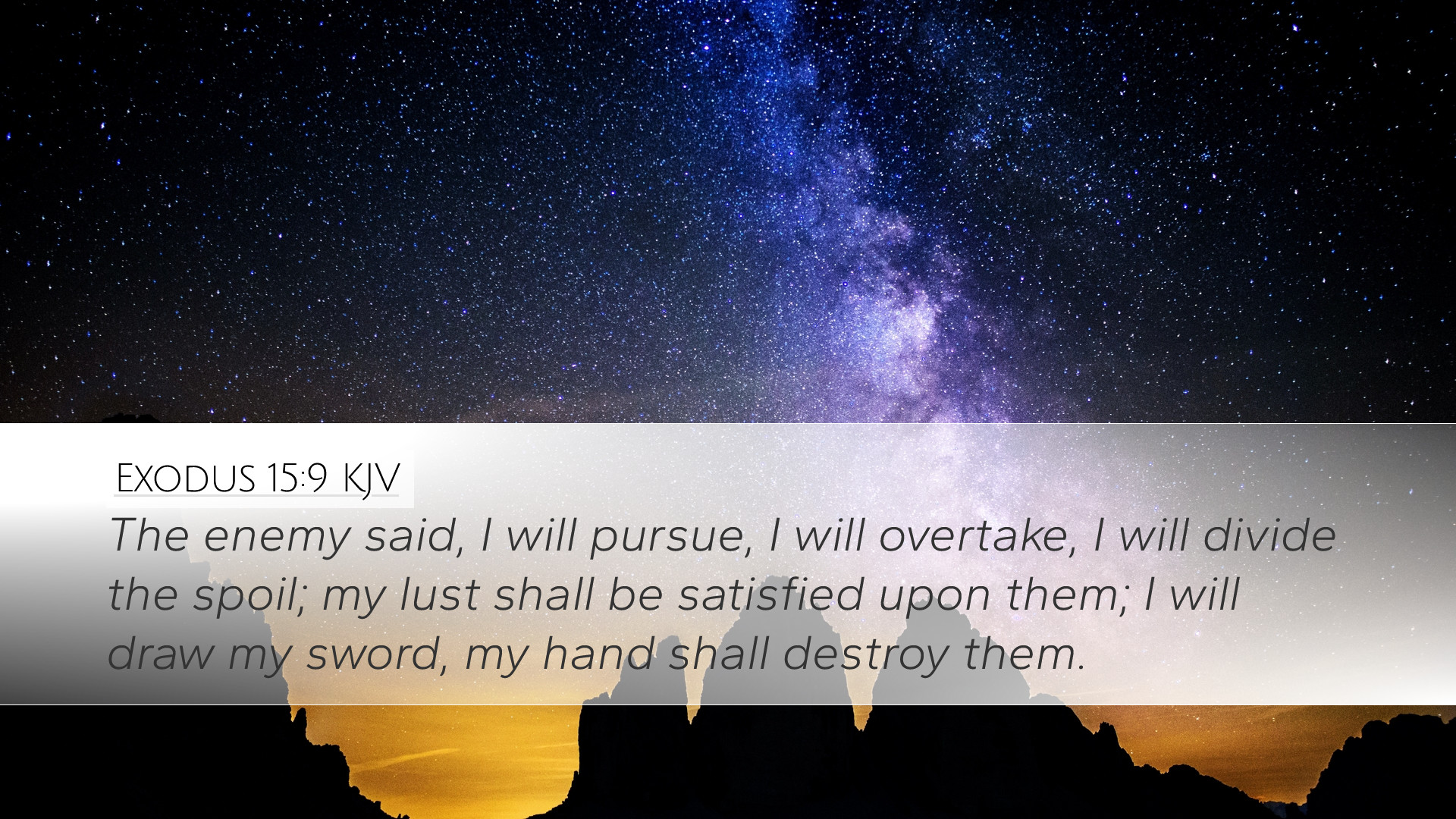Exodus 15:9 - Commentary and Insights
Verse Text: "The enemy said, ‘I will pursue, I will overtake, I will divide the spoil; my desire shall be satisfied upon them. I will draw my sword, my hand shall destroy them.’"
General Overview
This verse appears in the context of Moses' song, sung after the Israelites' deliverance from Egypt. It represents the mindset of the pursuing Egyptians, illustrating their determination and relentless pursuit of the Israelites.
Commentary Insights
1. The Psychological Profile of the Enemy
Matthew Henry emphasizes the arrogance and presumption of the enemy. The Egyptian forces, confident in their military superiority, believed they could swiftly reclaim the Israelites. Their declarations reflect a deep-seated desire for vengeance and pride. In their minds, they were not just pursuing a group of escaped slaves; they were determined to reassert their dominance.
2. The Pursuit as a Metaphor
Albert Barnes views Exodus 15:9 as a metaphor for the persistent and aggressive nature of sin in the lives of believers. Just as the Egyptians sought to recapture and destroy the Israelites, so too does sin seek to enslave and destroy the soul. This verse serves as a reminder of the spiritual warfare that believers face, underscoring the importance of vigilance and reliance on God’s strength to resist such pursuits.
3. Theological Implications
Adam Clarke explores the theological ramifications of this text. The bold declarations of the enemy highlight human folly when opposing God’s plans. Clarke notes that the Egyptians' downfall is imminent as they pursue their objectives in defiance of God’s will. This serves as a powerful lesson for theologians and students of Scripture: those who stand against God, regardless of their might or intentions, are ultimately attempting the impossible.
4. Historical Context
Understanding the historical context is vital to grasping the full meaning of this verse. The Israelites had just witnessed the ten plagues and the parting of the Red Sea. The relentless pursuit of Pharaoh’s army was indicative of Pharaoh’s hardened heart. Both Henry and Barnes highlight the divine intervention in Israel’s deliverance, which starkly contrasts with the Egyptians' failure to recognize God’s power.
5. Lessons for Leadership and Faith
Biblical leaders can draw valuable lessons from the Israelites' experience and the Egyptians’ folly. As Moses leads the Israelites in worship, he sets an example of gratitude and recognition of God’s sovereignty. Pastors and church leaders are reminded that their confidence should be in God’s promise rather than in human strength or resources. The enemy's threat becomes a backdrop against which God’s faithfulness can be celebrated.
6. The Role of Worship
After recounting the enemy’s intent, the passage transitions into a song of praise, affirming God’s power. This highlights the importance of worship as a response to God’s deliverance. Reflecting on this, Henry notes that God’s interventions in our lives should provoke worship and adoration. Thus, a faithful response to God’s mercies is to magnify His name through praise.
7. Encouragement in Trials
The adversities faced by the Israelites, symbolized by this verse, resonate with believers today. In moments when they feel pursued by life’s difficulties or spiritual opposition, they can find encouragement in the assurance that God champions His people. This aligns with Clarke’s emphasis on God as a deliverer, showing that despite the challenges believers may face, divine rescue is assured.
Conclusion
Exodus 15:9 serves as a powerful reminder of the spiritual realities at play in the lives of believers. The verses surrounding it illustrate the tenacity of the enemy in pursuit of destruction, simultaneously highlighting God’s incomparable might to deliver. For pastors, students, theologians, and scholars, this verse is not merely historical; it is a living testament to the ongoing struggle between sin and the grace of God—a struggle that calls for vigilance, worship, and unwavering faith in God’s promises.


